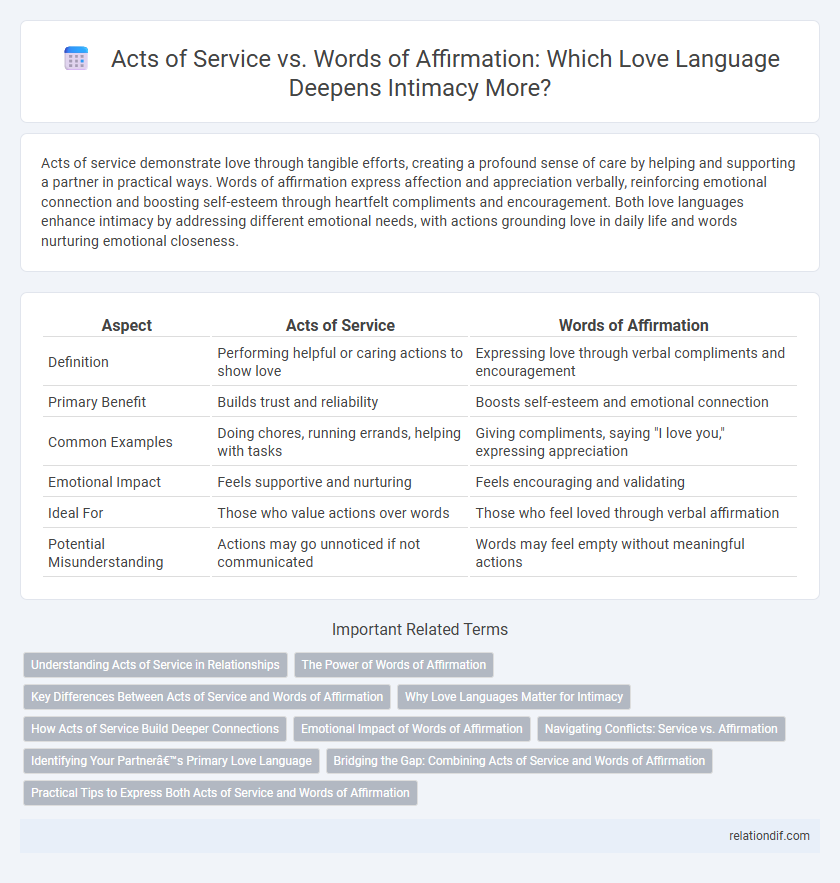Acts of service demonstrate love through tangible efforts, creating a profound sense of care by helping and supporting a partner in practical ways. Words of affirmation express affection and appreciation verbally, reinforcing emotional connection and boosting self-esteem through heartfelt compliments and encouragement. Both love languages enhance intimacy by addressing different emotional needs, with actions grounding love in daily life and words nurturing emotional closeness.
Table of Comparison
| Aspect | Acts of Service | Words of Affirmation |
|---|---|---|
| Definition | Performing helpful or caring actions to show love | Expressing love through verbal compliments and encouragement |
| Primary Benefit | Builds trust and reliability | Boosts self-esteem and emotional connection |
| Common Examples | Doing chores, running errands, helping with tasks | Giving compliments, saying "I love you," expressing appreciation |
| Emotional Impact | Feels supportive and nurturing | Feels encouraging and validating |
| Ideal For | Those who value actions over words | Those who feel loved through verbal affirmation |
| Potential Misunderstanding | Actions may go unnoticed if not communicated | Words may feel empty without meaningful actions |
Understanding Acts of Service in Relationships
Acts of service in relationships often convey deep love and commitment through meaningful actions rather than spoken words, highlighting the importance of tangible support. Understanding this love language can improve connection by recognizing that actions, such as helping with chores or running errands, reflect care and appreciation. Prioritizing acts of service fosters trust and strengthens emotional intimacy by demonstrating reliability and thoughtfulness consistently.
The Power of Words of Affirmation
Words of affirmation hold transformative power in nurturing intimacy by expressing love, appreciation, and support in a clear and heartfelt manner. Unlike acts of service that demonstrate care through actions, verbal affirmations directly communicate emotional validation, boosting self-esteem and deepening connection. Consistent positive language fosters trust and emotional safety, making partners feel valued and understood at a profound level.
Key Differences Between Acts of Service and Words of Affirmation
Acts of service communicate love through tangible actions, such as helping with chores or running errands, demonstrating care through practical support. Words of affirmation convey affection via verbal expressions, including compliments, encouragement, and heartfelt praise that boost emotional connection. The key difference lies in the mode of expression: acts emphasize doing, while words emphasize speaking, both fostering intimacy in distinct, complementary ways.
Why Love Languages Matter for Intimacy
Love languages shape how individuals express and receive emotional connection, with acts of service emphasizing tangible support and words of affirmation highlighting verbal encouragement. Understanding these differences enhances intimacy by ensuring partners feel valued and understood in ways that resonate personally. Recognizing and responding to a partner's primary love language fosters deeper trust and emotional closeness, essential components of lasting intimacy.
How Acts of Service Build Deeper Connections
Acts of service demonstrate love through tangible actions, creating a foundation of trust and reliability that strengthens emotional bonds. Performing thoughtful tasks like cooking a meal or helping with chores conveys care more powerfully than words alone. These acts fulfill practical needs and communicate commitment, fostering deeper intimacy and connection in relationships.
Emotional Impact of Words of Affirmation
Words of affirmation hold significant emotional impact by validating feelings and reinforcing self-worth, fostering deeper emotional connections. Unlike acts of service, which demonstrate love through actions, words provide immediate reassurance and emotional comfort that can reduce anxiety and build trust. Consistent verbal expressions of appreciation and encouragement create a positive emotional environment essential for intimacy growth.
Navigating Conflicts: Service vs. Affirmation
Navigating conflicts in intimate relationships requires understanding the nuanced differences between acts of service and words of affirmation as love languages. Acts of service emphasize tangible actions that demonstrate care and support, while words of affirmation focus on verbal expressions that validate feelings and build emotional connection. Prioritizing one over the other can lead to misunderstandings; effective conflict resolution involves recognizing and respecting the partner's preferred mode of emotional expression to foster mutual trust and harmony.
Identifying Your Partner’s Primary Love Language
Identifying your partner's primary love language is crucial for expressing intimacy effectively, especially when choosing between acts of service and words of affirmation. Acts of service demonstrate love through tangible help and thoughtful actions, while words of affirmation convey affection via genuine compliments and verbal encouragement. Recognizing whether your partner feels most valued through helpful gestures or spoken appreciation enhances emotional connection and relationship satisfaction.
Bridging the Gap: Combining Acts of Service and Words of Affirmation
Combining acts of service and words of affirmation enhances emotional intimacy by addressing both practical support and verbal encouragement, creating a balanced expression of love. Acts such as helping with daily tasks paired with sincere compliments strengthen trust and deepen connection in relationships. This integration fosters a holistic approach to affection, meeting diverse emotional needs and cultivating a resilient bond.
Practical Tips to Express Both Acts of Service and Words of Affirmation
Express love by combining acts of service with words of affirmation, such as preparing a partner's favorite meal while verbally acknowledging their efforts and significance. Small gestures like leaving handwritten notes or verbal praise after completing helpful tasks reinforce emotional connection and appreciation. Consistency in showing care through actions and affirming language deepens intimacy and trust in relationships.
Acts of service vs Words of affirmation Infographic

 relationdif.com
relationdif.com